news » national
National News for Jan. 3 - 17
By Alisa Lu | Jan. 20, 2009, 9:18 p.m. | In National »
Jan. 7 - The Congressional Budget Office (CBO) announced in a report that the government will face a $1.2 trillion deficit for the fiscal year ending in September. In the same report, the CBO also announced that government spending this year will exceed government revenue by eight percent - the highest deficit since World War II. Experts predict the deficit will shrink as the economy improves, but also said that the decrease in the spending and revenue gap will be offset soon after by the sky-rocketing costs of providing Medicare, Medicaid and Social Security to baby boomers when they retire. President-elect Barack Obama addressed the report in a conference soon after it was released and said that he would offer a specific plan to deal with the deficit when he submits his first budget proposal to Congress next month.
SCO's Inauguration survival guide
By Jeremy Gradwohl | Jan. 18, 2009, midnight | In National »
Millions are expected to turn out on Tuesday, Jan. 20, to see President-elect Barack Obama be sworn in. SCO brings you a guide of what to see, where to go and when to get there.
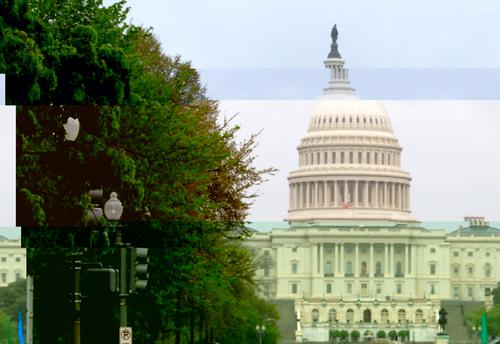
Inaugur-Nation
By Katie Sint | Jan. 16, 2009, midnight | In National »
As the election year dragged on, support for Obama was seen plastered all over backpacks, car bumpers and tons of other Blazer swag. Bumper stickers reading, "Got Hope?" summed up the spirit of the Blair population as election day inched closer. On Jan. 20, as millions flock to the National Mall to witness the inauguration, Blazers will be thinking, "yes we did."
National News for Dec. 20 - Jan. 2
By Poorna Natarajan | Jan. 4, 2009, midnight | In National »
Washington, D.C. Dec. 23 - President Bush granted 19 pardons and commuted one prison sentence for drug possession. Charlie Winters, who died in 1984 at 71, was the second person to ever be pardoned by a U.S. president after death. Winters violated the 1939 Neutrality Act by breaking an embargo on shipping weapons to Israel. Although he was praised by Israel Prime Minister Golda Meir for his efforts, Winters was jailed in the U.S.
National News for Dec. 6 - Dec. 19
By Kevin Teng | Dec. 20, 2008, midnight | In National »
Washington, D.C. The government is continuing to work on an automobile bailout package after Republican senators blocked the passage of the $15 billion bailout, reasoning that the bill would give the industry too much freedom without sufficient financial responsibilities. The bailout money will most likely come from the existing $700 billion plan or from the Federal Reserve's emergency fund, as the auto industry is expected to receive up to $15 billion. Current public opinion of the auto bailout is divided - 47 percent of Americans are for and 46 percent are against it, according to a Gallup poll. General Motors and Chrysler have said that their money will dry up within weeks while Ford has stated that they can still stay afloat. Chrysler halted production for a month starting Friday.
National News for Nov. 22 - Dec. 5
By Alisa Lu | Dec. 6, 2008, midnight | In National »
Nov. 23 - The United States Government agreed to provide $25 billion of cash and $20 billion worth of capital to Citigroup, a banking and financial conglomerate, in its largest financial bailout to a single entity ever. The government also promised to protect Citigroup against up to $306 billion worth of loses. In return, Citigroup agreed to give $27 billion of preferred stocks to the government and allow more government oversight. Two days before the bailout was announced, Citigroup's stock plunged to $3.77 from above $50 last summer.
National News for Nov. 7 - 21
By Kevin Teng | Nov. 21, 2008, midnight | In National »
Congress has been working on a $25 billion bailout for the failing U.S. auto industry. The Detroit's "Big Three" automakers (General Motors, Ford and Chrysler) have been adversely affected by the failing economy, as their share prices have dropped due to reduced profits from a low number of car sales. Automakers are likely to lose even more sales due to the frozen credit crisis. Democrats have been pushing for the $25 billion to be carved out of the existing $700 billion bailout for the housing crisis, whereas Republicans have asked that the money come from funds currently allocated to alternative energy research.
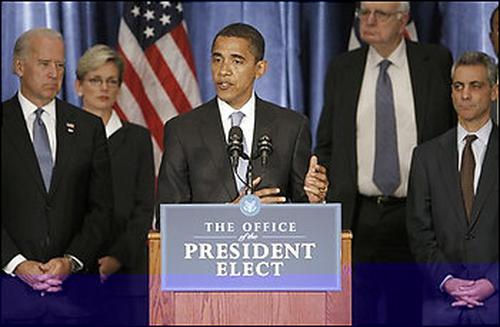
The transitioning blues
By David Tao | Nov. 18, 2008, midnight | In National »
On Nov. 4, President-elect Barack Obama made history, defeating his opponent, Senator John McCain (R-Ariz.), in an electoral landslide to become the nation's first black president. Voters also elected a solid majority of Democrats in both houses of Congress. Now that Democrats possess control of both the legislative and executive branches of the federal government for the first time since 1992, what lies in America's political future?
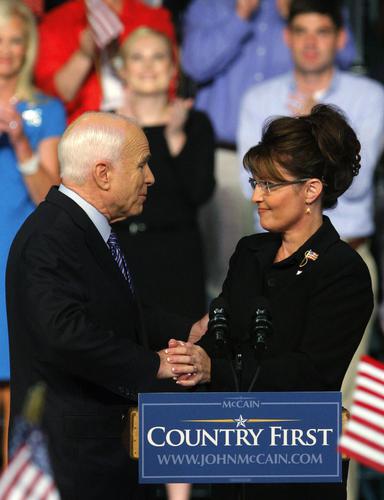
Best moments of the Obama-McCain showdown
By Emily Hsiao, Anika Manzoor | Nov. 12, 2008, midnight | In National »
This year's presidential race, which ended just over a week ago, sure got a lot of people talking. Recap videos were uploaded on YouTube, blogs were constantly updated with the most recent political gaffes and political commentators either lauded or lambasted candidates and campaigners for their latest antics. Although the end of the presidential race sadly marks the end of priceless election moments, Silver Chips Online is here with the best moments of the 2008 campaign.
National News for Oct. 24 - Nov. 7
By Alisa Lu | Nov. 8, 2008, midnight | In National »
Nov. 4 - Senator Barack Obama (D-Ill.) was elected the 44th President of the United States. Obama won 53 percent of the popular vote and 364 electoral votes to become the first African-American president. His opponent, Senator John McCain (R-Ariz.), won 46 percent of the popular vote and 163 electoral votes. Results in Missouri still have not been finalized. Senator Joe Biden (D-Del.) will become the 47th Vice President of the United States. In Congressional Elections, Democrats retained control of the House of Representatives and the Senate with a majority of 56 seats in the Senate and 254 seats in the House, including Independents who caucus with the Democrats. Three Senate seats are still undecided as results are too close to call and results may be recounted. Democrats are hoping to win all three seats so they can have a filibuster-proof Senate, as 60 votes are needed to end a filibuster.

Obama wins presidency
By Kiera Zitelman | Nov. 7, 2008, midnight | In National »
On Tuesday, Senator Barack Obama (D-Ill.) made history as he was elected the 44th president - and first black commander-in-chief - of the United States with 349 electoral votes and 64,246,857 popular votes (53 percent), according to CNN. Obama's opponents, presidential candidate Senator John McCain (R-Ariz.) and vice presidential candidate Governor Sarah Palin (R-Alaska), received 163 electoral votes and 56,634,776 popular votes (46 percent).
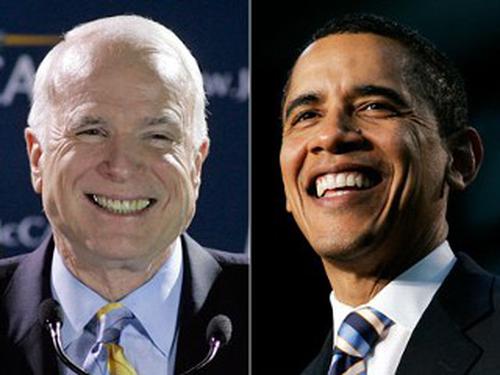
At issue at the polls
By Jeremy Gradwohl, Poorna Natarajan, Kevin Teng | Oct. 26, 2008, midnight | In National »
Ten days remain in what has been a long, tiring, historic race - one dubbed the most important of a lifetime - between Democratic presidential candidate Senator Barack Obama (Ill.) and Republican presidential candidate Senator John McCain (Ariz.). For those undecided or just plain confused Blazers, Silver Chips Online has summed up the ideals of these candidates that are the most important to the Blair community.
National News for Oct. 11 - 24
By Alisa Lu | Oct. 24, 2008, midnight | In National »
Oct. 13: After days of losses, the Dow Jones Industrial average gained 936 points (11.1 percent), the largest one-day gain in history. After more fluctuations, the Dow Jones lost 733 points (7.87 percent) - the second largest one-day loss ever - on Oct. 15.
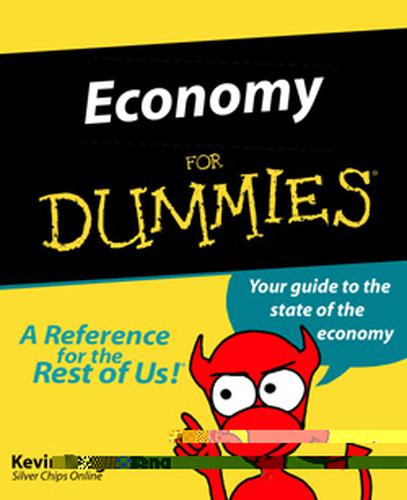
What went wrong with the U.S. economy
By Kevin Teng | Oct. 16, 2008, midnight | In National »
All this talk about mortgage, credit and recession has been getting really hot. The stock market fluctuates every day, mostly rapidly decreasing and sometimes rebounding. People have been snickering about this $700 billion bailout plan, yet the discussions have turned mainly political now as Americans wait to see how the economy settles. Many wonder what the crisis means in the long run.
National News for Sept. 26 - Oct. 10
By Kevin Teng | Oct. 11, 2008, midnight | In National »
The $700 billion bailout plan was passed to calm financial nerves. The money will go to banks that need to pay off bad debts. The plan is intended to restore confidence in the loan industry, which suffered as a result of the mortgage crisis. Insurance giant American International Group, which has suffered extreme losses and is a large recipient of bailout money, has allegedly spent $400,000 recently on a lavish vacation for its executives, according to Democratic Presidential Candidate and Senator Barack Obama (D-Ill).

Round two: As boring as it gets
By Alisa Lu, Monica Wei | Oct. 9, 2008, midnight | In National »
With Senator Barack Obama (D-Ill.) gaining crucial momentum heading into the month before Election Day, Senator John McCain (R-Ari.) needed a strong showing in this week's debate. After last Thursday's showdown between their running mates drew a record-breaking audience, sparks were expected to fly at the town hall debate. With the stock market sinking faster than it did in the Great Depression, the candidates, particularly McCain, needed to make a statement. Unfortunately, the only word to describe this debate was "lackluster."
National News for Sept. 13 - 26
By Kevin Teng | Sept. 26, 2008, midnight | In National »
The financial markets experienced extreme price volatility after the recent failures of the financial industry. The fundamental problem was caused by constant declines in housing prices. Banking institutions suffered major losses on home mortgages, as homebuyers are unwilling to pay the banks more than the property is currently worth. The mortgage problem has snowballed into other equity investments because the total capital losses of these major institutions result in reduced investor confidence; investors are not as willing to put money into major institutions that give bad loans.
National News for Aug. 30 - Sept. 12
By Alisa Lu | Sept. 12, 2008, midnight | In National »
Sept. 7: In an attempt to stabilize the volatile financial and housing markets, the federal government seized control of Fannie Mae and Freddie Mac, the two largest financial mortgaging companies in the United States. Secretary of the Treasury Henry Paulson announced the move to restore confidence in the two mortgage giants who together control a majority of the housing loans in the country. The International Monetary Fund estimated that losses from the current financial crisis, partly caused by Fannie Mae and Freddie Mac, could be over $1 trillion.
National News for May 17 - 30
By Alisa Lu | May 30, 2008, midnight | In National »
May 25 – The Mars Craft Phoenix successfully landed on Mars, and is ready to begin looking for signs of life on the planet. Using a parachute and thrusters in place of the typical protective air bags, Phoenix was the first such successful landing using this technology since the Viking Missions in 1976. Designed to stay in place, Phoenix will use a robotic arm to dig into the soil and ice and search for organic material and other signs that life exists, existed or could exist on Mars. Because Phoenix landed further north than any previous missions, scientists think the lender's accessibility to frozen water on or near Mars's surface will tell if the minerals and organic compound needed for life are or were present on Mars.
National News for May 3 - 16
By Kevin Teng | May 17, 2008, midnight | In National »
May 10 - Barack Obama took the first superdelegate lead over Hilary Clinton for the Democratic Nomination, according to superdelegate counts by the media. Since the nomination race begun, Obama has trailed Clinton in committed superdelegates. The change in alliance by some superdelegates that formerly supported Clinton and the commitment from previously unaligned superdelegates occurred shortly after Obama earned a convincing win in North Carolina and a close loss to Clinton in Indiana; Clinton required huge margins in those primaries to weaken Obama's momentum in the race. Some news outlets reported that Obama's loss in Indiana occurred mostly because of crossover votes from Republicans, signaling that Republicans see Obama as more of a threat to the presidential run of the presumptive Republican candidate, John McCain.
National News for April 19 - May 2
By Miriam Ragen | May 3, 2008, midnight | In National »
April 22 - The average life expectancy for many American women is decreasing. This is the first time that there has been a significant decline since the influenza epidemic in 1918. The most dramatic drop is in southern Virginia, where the life expectancy is five years less than it was in 1983. According to the report, the decline is due to an increase in deaths from lung cancer, diabetes, emphysema and kidney failure, many of which can be attributed to smoking cigarettes.
National News for April 5 - 18
By Miriam Ragen | April 18, 2008, midnight | In National »
April 16 - The Supreme Court ruled that lethal injections as a method of execution are constitutional. This decision will allow resuming the executions of the prisoners on death row in 34 states. A temporary ban was placed on executions while the case was being heard. Virginia will remove the ban on capital punishment immediately, according to Governor Timothy Kaine. The justices agreed that the injections did not violate the Eighth Amendment, which bans cruel and unusual punishment, in a 7 - 2 vote.
National News for March 22 - April 4
By Miriam Ragen | April 4, 2008, midnight | In National »
April 3 - The U.S. economy may be experiencing a recession, according to Federal Reserve Chairman Ben Bernanke. Fed officials are predicting a shrink in the economy during the first half of the year but then for the economy to strengthen in the second half of the year and to be strong by 2009. This announcement reflects a change in attitude by economic officials who two weeks earlier had said that there was a limited amount of economic activity but did not acknowledge the possibility of a recession.
Steve Hudson
By Emily Hsiao | March 31, 2008, midnight | In National »
Political Party: Republican Current Position: Practicing eye surgeon with the Baltimore-Washington Eye Center District: Eight Political Experience: None
Chris Van Hollen
By Emily Hsiao | March 31, 2008, midnight | In National »
Political Party: Democratic Current Position: Congressional Representative, 2002-present District: Eight Political Experience: Member of Maryland General Assembly, 1990-2002; Federal Affairs for Maryland Governor William Donald Schaefer, Senior Legislative Advisor; United States Senate Foreign Relations Committee, Professional Staff Member; Defense and Foreign Policy of former Maryland Senator Charles McC. Mathias, Jr., Legislative Assistant
We found 142 results.